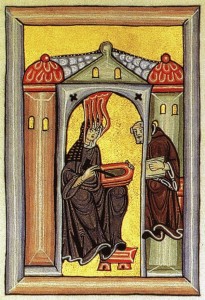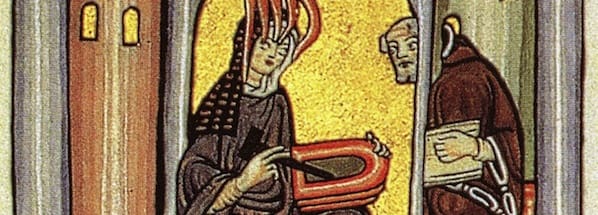At the center of the spiritual life is the real presence of Christ Jesus given to us in the Eucharistic worship  He instituted for our sake. Saint Hildegard of Bingen, Doctor of the Church, reminds us of the proper disposition we must maintain throughout our worship. It is a disposition of quaerere Deum, a reverent and intense seeking of God in love that takes us beyond the limit of what we can grasp by ourselves. It is not enough to focus ourselves and our mental energy as if we were solving a problem within our power to solve. To attain what is beyond our nature, we need help that comes from above our nature. To fully seek God, we must come to rely on the Holy Spirit who alone imparts the right disposition for this effort:
He instituted for our sake. Saint Hildegard of Bingen, Doctor of the Church, reminds us of the proper disposition we must maintain throughout our worship. It is a disposition of quaerere Deum, a reverent and intense seeking of God in love that takes us beyond the limit of what we can grasp by ourselves. It is not enough to focus ourselves and our mental energy as if we were solving a problem within our power to solve. To attain what is beyond our nature, we need help that comes from above our nature. To fully seek God, we must come to rely on the Holy Spirit who alone imparts the right disposition for this effort:
Let each of the faithful collect the powers of his soul with sincere and righteous heart, as his capacity for faith permits, and beware of searching into Divinity more exaltedly or profoundly than he senses or thought can grasp, but do it soberly as the Holy Spirit teaches; let him be subject to the fear of the Lord, since Man is only poor ashes. (Scivias, II, 6, 42)
The attitude by which we worship is a matter of accepting the “being-in-truth” of our existence – the profoundly human and personal truth that takes up both the noble greatness and frailty of our lives. We are ashes meant to be raised to glory and Saint Hildegard is inviting us to be what we are. The truth of our being or our “being-in-truth” is that each one of us is made with an ultimate purpose for the whole of our existence: union to God in love. Only when we begin to think, will and act in accord with this truth are we true to ourselves. The rub is that we are weak and always inclined to act against the deepest truth for which we have been summoned into existence. In other words, we constantly experience our need for salvation. Saint Hildegard wants us to have the attitude commensurate with the truth of our being: our existence involves accepting the fact that we are but “ashes,” but “ashes” filled with the Holy Spirit. The right disposition for our worship of God is born in this truth, a disposition of humble reverence and holy fear.
If the humanity by which we seek the Lord in profound exultation is only ashes, this passionate search must engage the whole human person. We must approach God in truth, in the sober harmony with our nature, a nature with real but frail powers of intellect, will and defining action. Just as God is in communion with Himself, as we approach the Trinity, all of our hidden judgments, secret desires and actions must be in harmony with our humanity. This is a communion Christ alone makes possible and without which our lives remain empty of true meaning and purpose.
This interior communion is characterized by an upright conscience: a conscience that stands erect on the solid ground of the truth, the truth that ought to exist between judgments and decisions, words and actions. Such inner integrity with ourselves can only be achieved through our repentance, the forgiveness of sins, and the power to become holy. This is a communion Christ alone makes possible and without which our lives remain empty of true meaning and purpose. Christ achieved this on the Cross and gives it to us through the Gift of the Holy Spirit.
This is the saving and awesome reality we approach when we approach Holy Communion. It is the salvific mystery we declare as we worship together at Mass. In other words, if we seek the Lord with loving faith in our worship, the Holy Spirit brings into unity our thinking, willing and acting. It is a matter of integrity, the integrity only known by grace. If we approach the unity of the Holy Trinity in the Sacrament of Holy Communion with living faith, the light and warmth of the Holy Spirit restore the beauty of what is most sacred about us. This illumination and heavenly fire renew in God’s holiness all that is good, beautiful and true about our lives. On the other hand, without the reverent faith by which one is surrendered to the Spirit of Truth, the “being-in-truth” of the individual is lost and at eternal risk. Saint Hildegard hears God explaining:
Let no division take place in this sacrament, as I, remaining undivided in Three Persons, am One Indivisible God; in the same way that thought, will and deed are in one human being, and without them that person is not. (Scivias, II, 6, 44)
Our worship is a profoundly human moment, a solemn moment of truth in which we either move towards greater integrity with ourselves and communion with God, or we betray ourselves in destructive self-deception. Because she wants her spiritual sons and daughters to avoid all forms of dangerous self-betrayal, Saint Hildegard is a proponent of frequent confession, fasting, and penance. This is not a matter of cultivating self-pity or navel gazing. It is a matter of maintaining a sobriety of life in which one keeps vigilance for the truth. Only in the truth can we find the Lord who is the source and summit of our very existence. By living in the truth that faith knows, Saint Hildegard describes the possibility of becoming “Bright of body and fiery of soul”:
These are clear in faith about the sacrament and do not doubt that it is the true body and the true blood of My Son. And so, perceiving this by faith, they are strengthened and made holy in body, and because they are sanctified by this mystery they will appear in this same body in Heaven after the resurrection of the dead; and their souls are transfigured and enkindled by the fiery gift of the Holy Spirit, so that, flooded with enlightenment, they reject earthly things and long for heavenly ones. How? As a fire is stirred to blaze by the wind, they are inspired by this sacrament to burn with celestial love. (Scivias, II, 6, 52)
Citations as translated by Mother Columba Hart and Jane Bishop in Hildegard of Bingen: Scivias, in Classics of Western Spirituality, (New York: Paulist Press, 1990) 237-287.
+
Art: Hildegard Von Bingen Receives A Divine Inspiration And Passes It On To Her Clerk, unknown artist, Miniatur aus dem Rupertsberger Codex des Liber Scivias (Medieval Miniature of Rupertsberger Codex Of Scivias Book), undated, PD-US author’s life plus 70 years or less, Wikimedia Commons.





